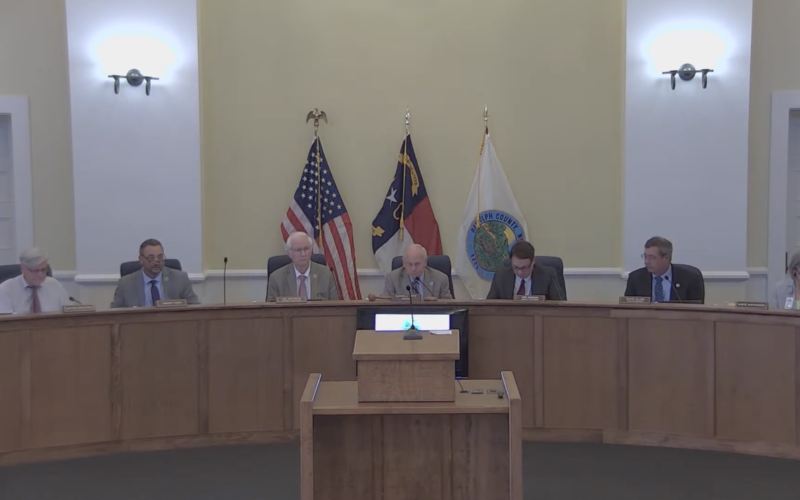ASHEBORO — The Randolph County Board of Commissioners met Monday, June 6 where they officially approved the abolishment and subsequent restructuring of four of the county’s fire districts.
The County closed the final public hearings for the fire tax district restructuring for Climax, Franklinville, Guil-Rand and Westside fire departments and passed the resolution to officially change all four of them.
The four fire departments will still cover the same areas, the only change is that they will no longer be held to a 15 cent fire tax cap, albeit the departments still would have to get approval by the Board of Commissioners for any proposed tax hike.
The board will open up public hearings to restructure another four fire districts in the coming months.
The board of commissioners then heard three budgeting requests, but did not take any action. The requests came from the Sandhills Center, the Children’s Home Society TogetherWorks Program and the Ramseur Public Library.
The Sandhills Center is an organization that operates in 11 counties, including Randolph, to offer treatment and support for mental health, intellectual/developmental disabilities and substance use disorders.
“The request I am submitting tonight is the same amount it has been for several years here in Randolph County and that is $844,000,” said Sandhills Center CEO, Victoria Whitt. “That funding stays right here in Randolph County to support behavioral health needs that do not have insurance, Medicare or Medicaid. I hope that as you’re doing your budget process, that you will see fit to continue funding the Sandhills Center.”
The Sandhills Center has been operating in Randolph County for a few years and the partnership has worked well for both the county and its citizens.
“For history, we used to be our own mental health agency, and we kind of went kicking and screaming a little bit, but we could not have picked a better partner,” said Chairman Darrell Frye.
The next request the board heard was for the Children’s Home Society TogetherWorks program.
TogetherWorks is a program that aims to utilize community collected data to create solutions to problems, focusing on family stress in Randolph County.
“When we looked at family wellness data, the overwhelming conclusion was that the outcomes are moving in the wrong directions for families,” said Donna Woods, strategy director for TogetherWorks. “At every stage of data that was received from DSS, we found more and more family stress.”
Woods outlined that the increased family stress has led to an overwhelm of the current DSS systems, preventing them from providing proper care. She stated that the current system is simply not working and stated that it was time for a new, community-driven change.
“With TogetherWorks, we believe it’s time to put the solutions back into the hands of the local community,” Woods said. “This really takes place via a four-step process that is action oriented and is driven by launching a citizen engagement team.”
The steps would be to create a local team composed of families who have felt these stressors first hand along with key stakeholders. Together, this team would diagnosis the problems, then develop distinct solutions, and finally implement those solutions over a two-year period, during which time, they’d partner with a top-tier research institution to best utilize and interpret the data.
The goal for the program is that by 2025, there will be a clear understanding of what is working and they will have the knowledge of how to expand the successful strategies across the county as a whole.
“The project is asking for $200,000 per year for three years, that would then be matched by private dollars,” said Matt Anderson, Director of the Institute for Family at Children’s Home Society of North Carolina. “Children’s Home Society has already raised and committed $750,000 to this project. That would leave a gap of about $430,000 on the total project budget of $1.7 million, which is already in the process of being raised.”
Finally, the Town of Ramseur requested that Randolph County take over operations of the Ramseur Public Library.
“The library system now is composed of four libraries operated by the county with significant municipal support – Asheboro, Archdale, Franklinville and Seagrove – and three libraries operated by their municipalities with significant county support – Liberty, Ramseur and Randleman,” said Public Library Director, Ross Holt. “We’re a bit unusual in this respect as most library systems in North Carolina, the library is one unit with all services and facilities operated and funded by the county government.”
According to Holt, the Town of Ramseur decided that what would be best for the Ramseur Public Library would be for it to be operated by the county as the town had run into financial trouble and needed to get its expenses better in line with its revenues.
The board of commissioners next approved two budget amendments for infrastructure projects in the county.
The first approval was for the expansion of the Wastewater Treatment Plant in Seagrove by LKC Engineering for a cost of $343,500. According to County Engineer, Paxton Arthurs, the firm expects to have the project constructed within two years.
The board then approved an addendum to the contract with Wooten for the I-74 Industrial Site Sewer Design to increase the flow capacity from 150,000 gallons a day to 350,000 gallons a day.
The 350,000 gallon a day marker would cover the outtake for the whole of the Randleman sewer basin, according to Arthurs.
The cost is $82,500, to increase the size of the gravity sewer and force main from 8-inches to 12-inches and extend the line by 8,800 feet to another intake for the City of Asheboro to have the ability to provide this capacity.
The Randolph County Board of Commissioners will next meet July 11.

